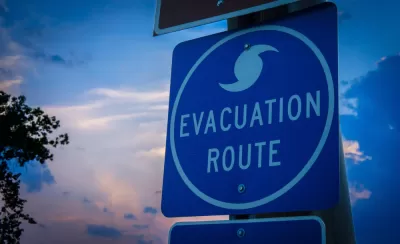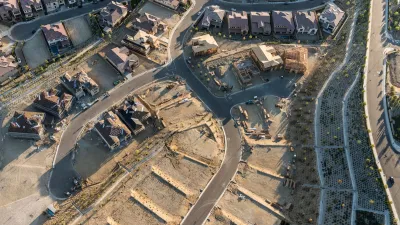Officials in cities along the East Coast are realizing that maybe they shouldn’t rebuild on land that repeatedly floods. But that’s easier said than done.

There is an extreme, persistent lack of affordable housing in the U.S. There is also an accelerating host of climate-related changes to our landscape—severe heat and drought, increased violent storms, rising sea levels, and worsening flooding. Each is a significant challenge on its own, but the lack of affordable housing and the increase in climate-related changes are related in many ways.
Lower-income households have historically been forced to live in less desirable areas—often flood-prone ones—making them more vulnerable to climate change-aggravated disasters. And where they have settled on higher ground, they may find themselves pushed out by wealthier people who are also fleeing sea level rise. Aid for recovery from frequent and severe disasters is often apportioned slowly and inequitably, compounding these problems. Meanwhile, in a cost-conscious industry, finding the funds to build affordable homes that are resilient to storms and flooding is an ongoing challenge.
While there are cities, states, and municipalities that are doing their best to make all sorts of buildings resilient, officials are usually responding to weather-related events rather than preemptively looking at issues like expected sea level rise, says Guillermo Ortiz, who formerly served as a researcher with the Center for American Progress and now works as the sustainability and diversity educational programs manager at the University of California. And when it comes to affordable housing development, the main concern is still about building more units. This is shortsighted thinking, says Ortiz. If you build 100 affordable units and then lose them in the next storm, you haven’t improved the situation.
Officials in areas like North Miami, Florida, and Princeville, North Carolina, are taking a different approach—they’re deciding not to rebuild on land that has seen its fair share of flooding and instead, they are focusing on buyouts, building on higher ground, and other mitigation efforts.
FULL STORY: Deciding Not to Rebuild After Climate-Related Disasters

Alabama: Trump Terminates Settlements for Black Communities Harmed By Raw Sewage
Trump deemed the landmark civil rights agreement “illegal DEI and environmental justice policy.”

Planetizen Federal Action Tracker
A weekly monitor of how Trump’s orders and actions are impacting planners and planning in America.

The 120 Year Old Tiny Home Villages That Sheltered San Francisco’s Earthquake Refugees
More than a century ago, San Francisco mobilized to house thousands of residents displaced by the 1906 earthquake. Could their strategy offer a model for the present?

In Both Crashes and Crime, Public Transportation is Far Safer than Driving
Contrary to popular assumptions, public transportation has far lower crash and crime rates than automobile travel. For safer communities, improve and encourage transit travel.

Report: Zoning Reforms Should Complement Nashville’s Ambitious Transit Plan
Without reform, restrictive zoning codes will limit the impact of the city’s planned transit expansion and could exclude some of the residents who depend on transit the most.

Judge Orders Release of Frozen IRA, IIJA Funding
The decision is a victory for environmental groups who charged that freezing funds for critical infrastructure and disaster response programs caused “real and irreparable harm” to communities.
Urban Design for Planners 1: Software Tools
This six-course series explores essential urban design concepts using open source software and equips planners with the tools they need to participate fully in the urban design process.
Planning for Universal Design
Learn the tools for implementing Universal Design in planning regulations.
Clanton & Associates, Inc.
Jessamine County Fiscal Court
Institute for Housing and Urban Development Studies (IHS)
City of Grandview
Harvard GSD Executive Education
Toledo-Lucas County Plan Commissions
Salt Lake City
NYU Wagner Graduate School of Public Service





























